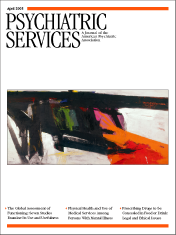Robert Simon, M.D., is clinical professor of psychiatry and director of the program in law and psychiatry at Georgetown University School of Medicine in Washington, D.C. Simon's stated goals for this second edition of Posttraumatic Stress Disorder in Litigation: Guidelines for Forensic Assessment are to bring direction and discipline to the assessment of posttraumatic stress disorder (PTSD) in litigation and to continue the dialogue sparked by the first edition among mental health professionals, the legal community, and third-party payers concerning ways to improve the psychiatric and psychological assessment of PTSD claimants. The book is divided into nine chapters that address the use of PTSD claims in the courtroom. Each chapter provides guidelines for forensic assessment that can serve both plaintiffs and defendants in litigation involving PTSD. The chapters' authors are nationally known experts.
The topics covered include disability determinations in PTSD litigation, PTSD in employment litigation, forensic laboratory testing for PTSD, forensic psychiatric assessment of claimants, guidelines for diagnosing PTSD among children and adolescents, forensic psychological assessment, detection of malingering among persons with PTSD, and a review of PTSD research findings.
Simon's chapter on the forensic assessment of PTSD claimants is well written and comprehensive. He outlines five basic questions that the forensic examiner should consider in the evaluation of the PTSD claimant. Each question is explored, and guidelines are proposed. Simon emphasizes the importance of using official diagnostic manuals and the professional literature when diagnosing PTSD.
The chapters by Green and associates and Pitman and associates provide a useful review of the scientific findings in the area of PTSD. Several authors reference the severe psychological injury caused by the terrorist attacks on the World Trade Center and the Pentagon. However, none of the authors addresses the recent research on the aftermath of the attacks. One chapter's authors, Green and Kaltzman, identify the level or severity of exposure to stressors as the primary risk factor associated with the development of PTSD. According to a longitudinal survey in the
Journal of the American Medical Association, the risk of PTSD was not directly associated with the exposure to or loss from the trauma but rather to use of specific coping strategies (
1). Data from studies of the September 11 attacks suggest that individuals who are not present at a traumatic event may experience stress reactions (
2).
The book includes a thorough analysis of the problem areas in the forensic assessment of PTSD litigants. The guidelines proposed in each chapter are practical and clearly written. This book is recommended for both clinicians and attorneys who work in the area of PTSD litigation. Simon has done an excellent job of providing the reader with a comprehensive review of PTSD litigation in easy-to-understand terms.

